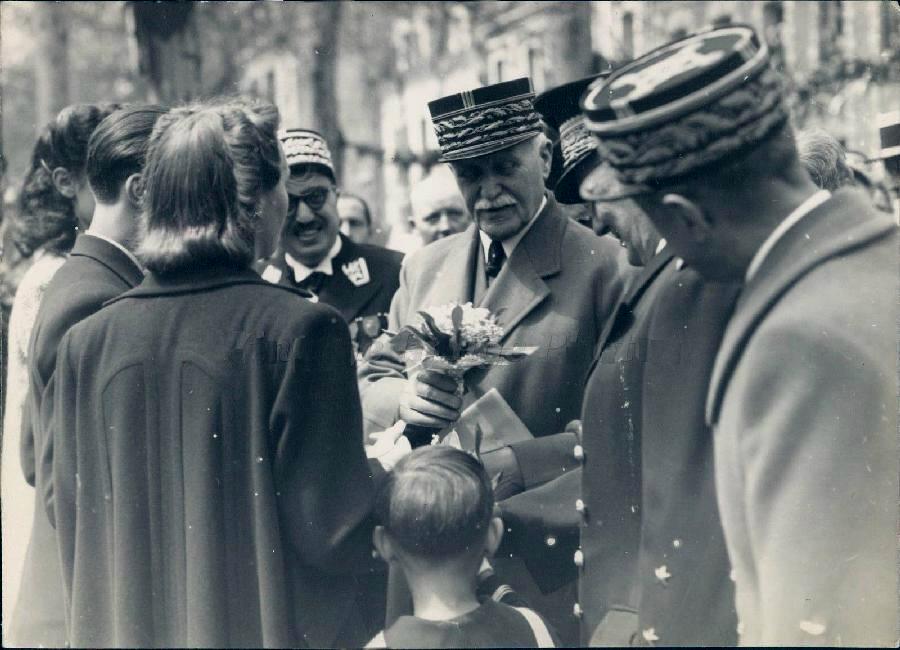
World War II Biographies: Marshal Henri-Philippe Pétain (1856-1951)

Figure 1.--Here Marshall Pétain receives flowers from some French youngsters. It was May Day 1941 on the eve of the German invasion of the Soviet Union. May Day was the primary holiday of socialists and Communidsts. Vichy attempted to convert it into a patriotic celebration. The caption reads, "Vichy May 1st 41: Nay od Work and Social Peac. Marshal Pétain receiving Lily of Valley from young boy and girl." He was still very popular in France, but after the failure of the German invasion of the Soviet Union the Germans increased their exploitation of France and began conscripting workers to work for war industries in the Reich. Pétinspopularity began to olummet.
|
|
Marshal Henri-Philippe Pétain was perhaps the oldest man to play an important role in World War II. He was one of the great heros of France. He played a key role in saving the French Army during World war I when it looked like in my crack in the face of the German onslaught. He led the heroic French defense at Verdun, the single-most horific battle of World War I. The French stopped a massive German assault. An elderly Pétain was voted premier of France by a fleeing French Assembly as the German Wehrmacht took Paris and poured into central France. He agrred to an armistace with NAZI Germany 8 days after becoming premier. Britain and France had an agreement that there would be no seprate peace. The British realized that the French Army was defeated, but Churchill did not expect the French to sign a peace treaty and colaborate with the Germans in the war effort. Pétain set up his government in Vichy, a resort city in the unoccupied zone of southern France. One historian described him as as becoming 'a despised puppet' of NAZI Germany. This was not the case at first. He was at first very popular with the French people during the first years of the occupation. Many French people believed he saved them from a horific German occupation. Pétain portrayed France's defeat as the fault of Communists, Socialists, and cosmopolitans, a code word for Jews. As far as the Communists and socialists are concered, this wa in part true, but the major cause was military incompetence. And Pétain was detrmined above all to protect the honor of the French Army. A military leader himself, he was not about to place the blame on the French Army, a still widely repected institution in France. Pétain sought to institute a social revolution with he called a National Rvolution, by focusing on patriotism and rooting out left-wing, cosmopolitan influences. Pétain like many French people saw the NAZIs as having won the war making resistance futile. If the poweful French Army could be defeated in weeks, how could anuone resist the NAZIs? Thus Pétain sought an accomdation with Hitler. After the British attack on the French fleet, he was willing to collaborate with the German war effort, he drew the line, however, at participating in and committing French soldiers to combatg and joining Hitler's invasion of the Soviet Union. When the Allies liberated France in 1944, the retreating Germans brought Pétain Germany. Pétains collaboration with the Germas probably did save Frenchmen some of the more brutal aspects of NAZI rule. But in doinf so it made it easier forthe Germans to loot the Frebch economy and allowed them ti use France t support the war economy. The major mistake that Pétain and his supporters made is assuming that the war-time occupation was as bad as it got. Not at all understading what hitler and the NAZIs had in store fir France after they won the War. After the NAZI surrender in 1945, Pétain was returned to France. He was tried and found guilty of treason. He was sentenced to prison for life rather than death because of his age and previous srvice to the nation. He died in prison 6 years later (1951). p.5.
CIH -- WW II

Navigate the Children in History Website:
[Return to Main NAZI 1940 diplomacy page]
[Return to Main World War I biography page]
[Return to Main World War II biography page]
[Return to Main Vichy page]
[Return to World War II First phase campaign page]
[About Us]
[Aftermath]
[Biographies]
[Campaigns]
[Children]
[Countries]
[Deciding factors]
[Diplomacy]
[Geo-political crisis]
[Economics]
[Home front]
[Intelligence]
[POWs]
[Resistance]
[Race]
[Refugees]
[Technology]
[Totalitarian powers]
[Bibliographies]
[Contributions]
[FAQs]
[Images]
[Links]
[Registration]
[Tools]
[Return to Main World War II page]
[Return to Main war essay page]
[Return to CIH Home page]
Created: 10:12 AM 5/18/2016
Last updated: 10:12 AM 5/18/2016



